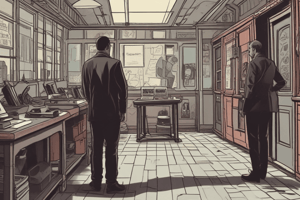Podcast
Questions and Answers
What aspect of communities is highlighted as being linked to delinquency by Thrasher, Shaw, and McKay?
What aspect of communities is highlighted as being linked to delinquency by Thrasher, Shaw, and McKay?
What type of controls did Albert Reiss identify as crucial in preventing delinquency?
What type of controls did Albert Reiss identify as crucial in preventing delinquency?
According to Ivan Nye, what primarily motivates delinquent behavior?
According to Ivan Nye, what primarily motivates delinquent behavior?
What significant role does the family play, according to Ivan Nye?
What significant role does the family play, according to Ivan Nye?
Signup and view all the answers
What was a key finding of Reiss regarding young males on probation?
What was a key finding of Reiss regarding young males on probation?
Signup and view all the answers
How do successful students generally perceive their school experience?
How do successful students generally perceive their school experience?
Signup and view all the answers
What characterizes anomic suicide?
What characterizes anomic suicide?
Signup and view all the answers
What is one of the primary ways that school affects delinquency?
What is one of the primary ways that school affects delinquency?
Signup and view all the answers
Which factor contributes to the occurrence of deviance in weak social controls?
Which factor contributes to the occurrence of deviance in weak social controls?
Signup and view all the answers
Which of the following statements about the relationship between religiosity and delinquency is accurate?
Which of the following statements about the relationship between religiosity and delinquency is accurate?
Signup and view all the answers
What was a significant finding of Shaw and McKay regarding crime in Chicago?
What was a significant finding of Shaw and McKay regarding crime in Chicago?
Signup and view all the answers
What factor is critical for religion to effectively reduce delinquency in a community?
What factor is critical for religion to effectively reduce delinquency in a community?
Signup and view all the answers
What methodologically flawed assumption was made in early control theory research?
What methodologically flawed assumption was made in early control theory research?
Signup and view all the answers
According to Stark et al. (1982), what role does a moral community play in relation to religion and delinquency?
According to Stark et al. (1982), what role does a moral community play in relation to religion and delinquency?
Signup and view all the answers
According to the content, what has led to the development of criminal subcultures in certain neighborhoods?
According to the content, what has led to the development of criminal subcultures in certain neighborhoods?
Signup and view all the answers
Which of the following is NOT associated with anomic suicide?
Which of the following is NOT associated with anomic suicide?
Signup and view all the answers
What is a consequence of school failure on delinquency, according to the content?
What is a consequence of school failure on delinquency, according to the content?
Signup and view all the answers
What explains the strong negative correlation found between religiosity and delinquency in later studies?
What explains the strong negative correlation found between religiosity and delinquency in later studies?
Signup and view all the answers
What did Thrasher identify as a location where gangs predominantly formed?
What did Thrasher identify as a location where gangs predominantly formed?
Signup and view all the answers
What implication arises from the ecological fallacy in control theory?
What implication arises from the ecological fallacy in control theory?
Signup and view all the answers
What impact do school experiences have on a child's future life chances?
What impact do school experiences have on a child's future life chances?
Signup and view all the answers
What aspect primarily affects a child's development of internal controls within a family?
What aspect primarily affects a child's development of internal controls within a family?
Signup and view all the answers
According to Hirschi's social control theory, which aspect emphasizes the importance of emotional ties?
According to Hirschi's social control theory, which aspect emphasizes the importance of emotional ties?
Signup and view all the answers
Which of the following is NOT one of the four aspects of social bonds that Hirschi identified?
Which of the following is NOT one of the four aspects of social bonds that Hirschi identified?
Signup and view all the answers
What describes a key characteristic of individuals with low self-control according to Gottfredson and Hirschi?
What describes a key characteristic of individuals with low self-control according to Gottfredson and Hirschi?
Signup and view all the answers
How does commitment influence an individual's likelihood of engaging in deviant behavior?
How does commitment influence an individual's likelihood of engaging in deviant behavior?
Signup and view all the answers
What is the primary cause of low self-control, as identified by Gottfredson and Hirschi?
What is the primary cause of low self-control, as identified by Gottfredson and Hirschi?
Signup and view all the answers
What role does involvement in conventional activities play according to Hirschi's theory?
What role does involvement in conventional activities play according to Hirschi's theory?
Signup and view all the answers
What is often a direct consequence of the absence of belief in conventional values?
What is often a direct consequence of the absence of belief in conventional values?
Signup and view all the answers
What primary factor contributes to an individual being less likely to violate community norms?
What primary factor contributes to an individual being less likely to violate community norms?
Signup and view all the answers
Which theory suggests that a lack of ties to conventional society increases the likelihood of associating with deviant peers?
Which theory suggests that a lack of ties to conventional society increases the likelihood of associating with deviant peers?
Signup and view all the answers
According to control theory, what is the primary focus when explaining crime?
According to control theory, what is the primary focus when explaining crime?
Signup and view all the answers
Which statement reflects a criticism of control theory by conflict criminologists?
Which statement reflects a criticism of control theory by conflict criminologists?
Signup and view all the answers
What has a stronger correlation with delinquency and drug use than social control variables?
What has a stronger correlation with delinquency and drug use than social control variables?
Signup and view all the answers
How does control theory primarily address upper-world crime?
How does control theory primarily address upper-world crime?
Signup and view all the answers
Which factor can be integrated into a structural perspective according to critics of control theory?
Which factor can be integrated into a structural perspective according to critics of control theory?
Signup and view all the answers
What outcome is linked to adolescents who primarily lack ties to conventional individuals?
What outcome is linked to adolescents who primarily lack ties to conventional individuals?
Signup and view all the answers
What approach does Patterson suggest for addressing criminal behavior in children?
What approach does Patterson suggest for addressing criminal behavior in children?
Signup and view all the answers
Which characteristic is NOT listed as a quality of effective schools?
Which characteristic is NOT listed as a quality of effective schools?
Signup and view all the answers
What is the primary focus of social control theories?
What is the primary focus of social control theories?
Signup and view all the answers
Which component of the social bond, according to Hirschi, pertains to one's attachment to others?
Which component of the social bond, according to Hirschi, pertains to one's attachment to others?
Signup and view all the answers
How can schools positively impact at-risk students?
How can schools positively impact at-risk students?
Signup and view all the answers
In the context of strengthening families, effective non-physical punishment helps to address which issue?
In the context of strengthening families, effective non-physical punishment helps to address which issue?
Signup and view all the answers
What is a consequence of disorganized communities according to social control theories?
What is a consequence of disorganized communities according to social control theories?
Signup and view all the answers
Which aspect of the social bond relates to personal dedication to societal norms?
Which aspect of the social bond relates to personal dedication to societal norms?
Signup and view all the answers
Study Notes
Chapter 14: Social Control Theory
-
Social control theory examines why people do not commit crime.
-
Human beings are neither innately good nor evil; they have the capacity to commit wrong.
-
Conformity, not deviance, is the focus.
-
Key questions include: why don't all people commit deviance? Why do people refrain from deviance? How do social factors bind individuals to social order?
-
Early social control theories linked crime rates to social structure or social disorganization.
-
Durkheim (1951) highlighted the importance of social bonds in understanding crime.
-
Egoistic suicide: A lack of social ties leads individuals to act on personal interests.
-
Anomic suicide: Occurring when society lacks moral guidance, people lack direction and more likely to deviate.
Theories of Social Disorganization
- The earliest theories focused on community-level characteristics that led to crime and deviance.
- These factors include: geographical and social breaks in the structure of social organization.
- Durkheim, Thrasher, Shaw, and McKay have contributed to these theories.
Early Social Control Theories - Reiss and Nye
- Reiss differentiated between social and personal controls.
- Social control involves ties to social groups.
- Personal control is internalized by the individual.
- Successful interactions with family and the community are positively associated with less delinquency.
- Nye expanded on Reiss, using self-reported data.
- His theory highlights the relative costs of alternative behaviors in relation to deviance.
- Nye emphasized the significance of family relationships (e.g., strength of family relationships, discipline,) for social control.
Hirschi and the Social Bond
- Hirschi highlights four aspects of the social bond that restrain deviant behavior:
- Attachment: Bonds to others
- Commitment: Degree to which one pursues conventional goals
- Involvement: Involvement in conventional activities
- Belief: Belief in conventional values
- Individuals with weaker social bonds are more prone to deviance.
Self-Control: The General Theory of Crime
- Gottfredson and Hirschi developed this theory in 1990.
- People with low self-control are more prone to risky behaviors and crime, particularly when opportunities arise.
- Low self-control is linked to childhood socialization, involving poor relationships or poor parenting.
- This theory argues that low self-control persist throughout one's life.
Family Relationships
- Family relationships are strongly related to delinquency. Strong, warm relationships are associated with low delinquency rates.
- Mutual rejection and hostility are common in families with delinquents.
- Parental supervision and clear discipline are crucial for restraining delinquency. Children with consistent discipline are less likely to engage in delinquent behavior.
- Strong parental role models can serve as a deterrent to delinquency. However, there might be associations between parent and child criminality due to factors like poverty or bad parenting.
Schooling
- Schools play a crucial role in socialization and delinquency.
- Successful school experiences promote conventional behavior through rewards and a stake in conformity.
- School failure can contribute to delinquency through:
- Lack of opportunity (e.g., educational qualifications).
- Daily struggles and challenges related to school.
- School experiences with regards to socialization can lead to problems.
Religion
- Early studies showed a modest negative relationship between religiosity and criminality.
- Religiosity, or involvement in religious activities, is not strongly associated with delinquency in particular.
- Religion has the greatest influence on behavior in very religious communities.
- Stark et al (1982): Religious influences permeate the community and reinforce norms, making deviance costlier.
Questions about Social Control Theory
- How does social control theory explain "upper-world" crime? (control theory does not appear to explain white-collar crime and crime committed by individuals with strong social bonds)
- Does everyone have the same motivation to deviate? (Social control theory assumes motivation for deviance is natural. However, factors like ties to delinquent peers might be more relevant.)
- The Role of Delinquent Peers: Combining differential association and control theory leads to a better explanation of crime and delinquency.
Issues with Control Theory
- Critics argue that control theory ignores political and economic structures that influence crime.
- However, control variables can be included in structural perspectives.
Policy Implications
- Family: Strengthening family relationships, emphasizing parental love, care, and effective discipline to help children.
- Schools: Implementing effective interventions in schools to foster social bonds and pro-social behavior.
Studying That Suits You
Use AI to generate personalized quizzes and flashcards to suit your learning preferences.
Related Documents
Description
This quiz explores key concepts in sociology related to delinquency, focusing on the insights of Thrasher, Shaw, McKay, Reiss, and Nye. It covers the influence of community, family, social controls, and schools on delinquent behavior as well as the role of religiosity in mitigating deviance. Test your understanding of these critical theories in the study of delinquency.




